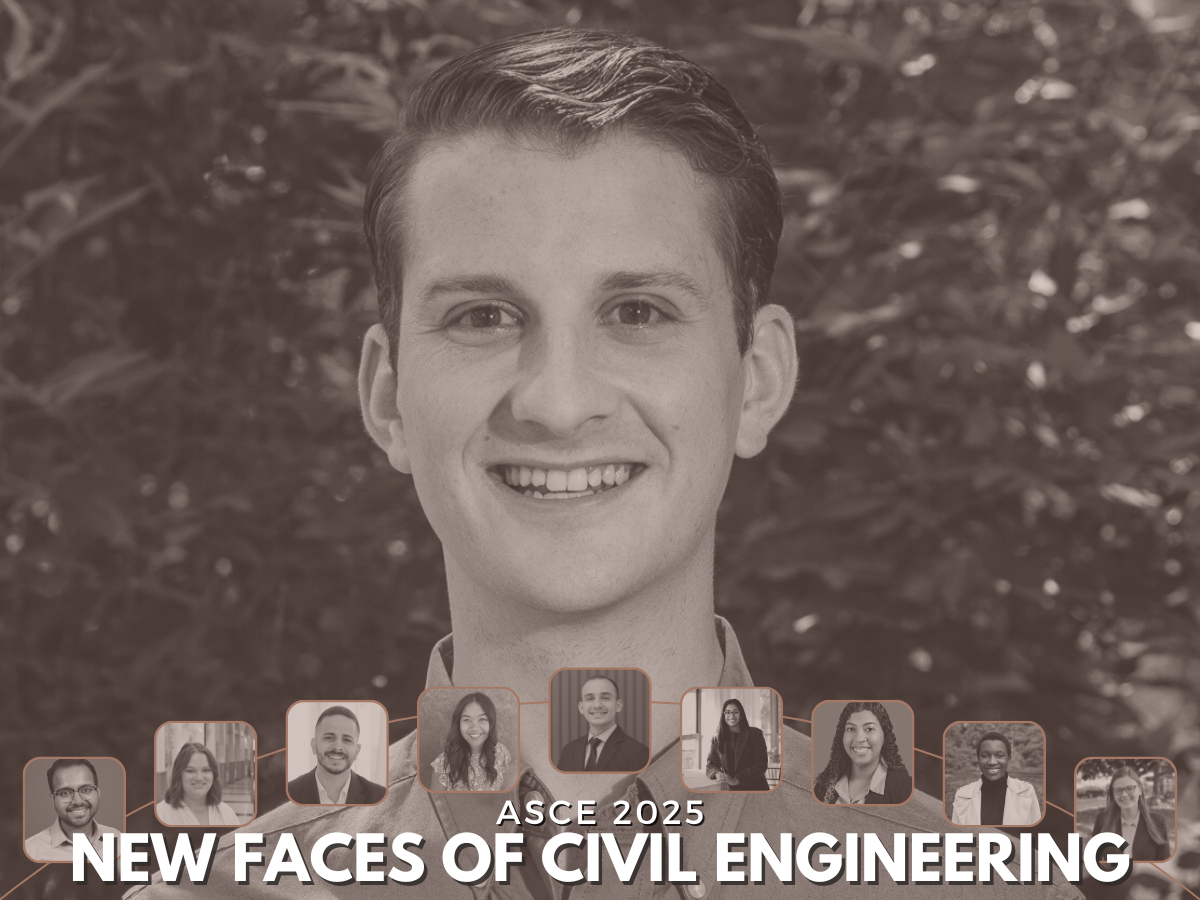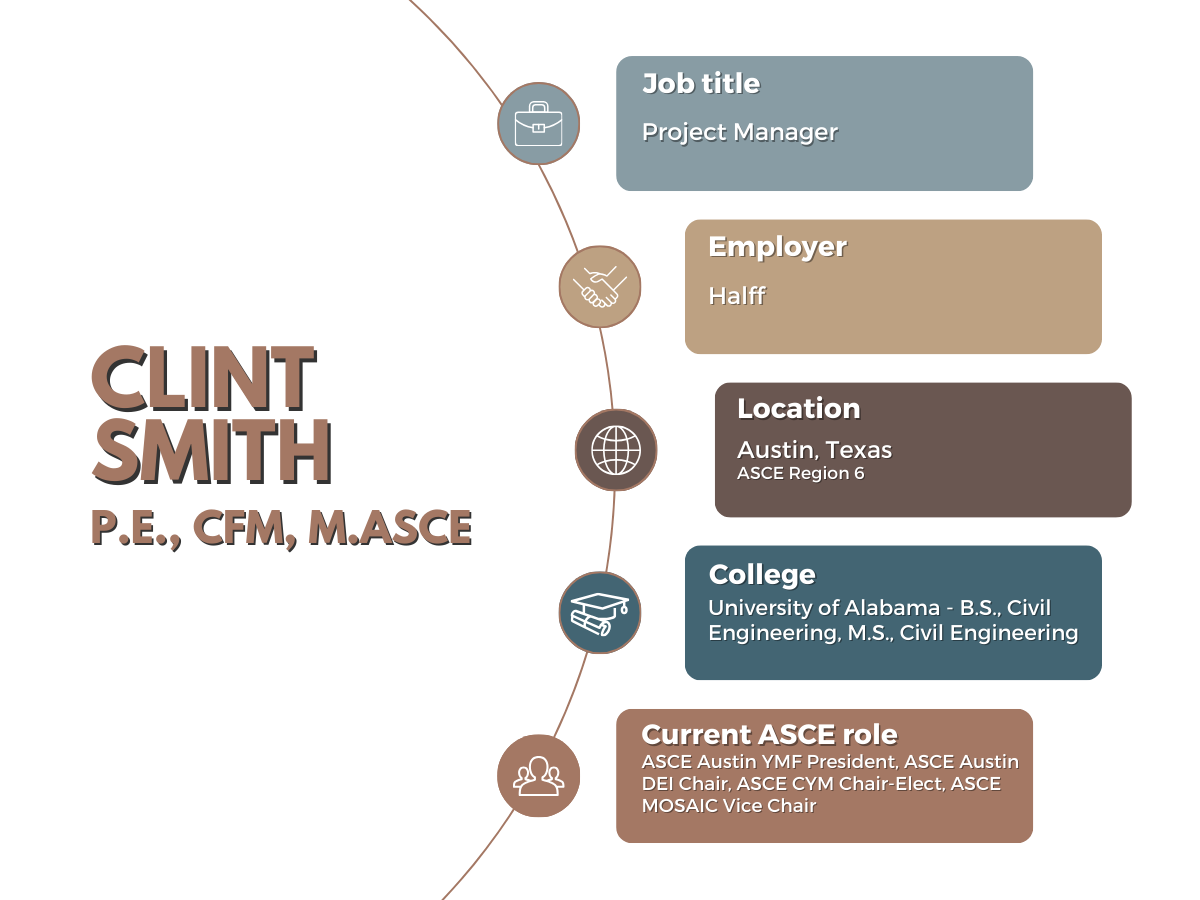

By all accounts, Clint Smith is a very friendly person.
Kind and generous; his quick, sarcastic wit delivered in an Alabama drawl.
But nice as he is, don’t be mistaken. Smith is also a fighter – relentless in his drive to improve as a water resources engineer and stubborn in his stance to stand up for what he believes in.
"Yeah, it’s a trail," Smith said. "It’s forging your own path when the path isn’t seen. It’s going through the jungle, and it feels like you’re the first person with the machete who has to clear the way."
Growing up in rural Hatton, Alabama, there was no jungle. But there was a farm, and a lot of quiet time by himself reading fantasy novels (a lot of Hunger Games, Divergent, and Percy Jackson books) and dreaming of an engineering career he could make his own.
"When I was growing up, I’d never really seen an engineer who was part of the LGBTQ community and didn’t see the community visibly represented," Smith said. "That wasn’t something that was on display for various reasons. One: a lot of gay men died in the 1980s AIDS epidemic. And there’s also the social ramifications or consequences of coming out for many people."
Smith moved to Austin, Texas, after college and works as a project manager on the water/wastewater team for Halff. He is chair-elect of the ASCE Committee on Younger Members and the vice chair of ASCE’s MOSAIC (Members of Society Advancing an Inclusive Culture), among many Society roles and other volunteer activities.
As a member of MOSAIC, he created the Code of Conduct for ASCE events and continually strives to ensure that all members’ voices are heard and represented. And with CYM, he views his role as to create programming for Younger Members to learn from and use to help grow into a career that they love.
"I said I want to be my own role model and blaze forward and make that path so then someone else in the future can maybe see themselves in me in engineering," Smith said.
ASCE has honored Smith as a 2025 New Face of Civil Engineering. He recently spoke with Civil Engineering Source about his career.
Civil Engineering Source: What’s the accomplishment or aspect of your career so far that you’re most proud of?
Clint Smith: The thing in my career that has meant the most to me is probably just how I’m treated at my company. That may seem like a strange answer, but I’ve worked really hard to be the best employee I can be and to be a great people person.
Finding a company that has responded in kind and allowed me to have many different passions and take the reins on many different initiatives has been something that’s been very impactful in my life.
With that, I have been able to advance my personal brand, which someone recently bestowed upon me as: water quality, water supply, and diversity, equity, and inclusion. And I was like, "Oh, I love that."
Being recognized as someone who does those things – not just by my close friends or by my immediate coworkers, but by my supervisors all the way up to the CEO of the firm that I work for – was really impactful to know that my passions are heard and that I am supported in those things.
Source: That’s great that your firm supports you, but I’m sure it isn’t a coincidence. How did you earn that respect?
Smith: At my previous firm, I did water and wastewater engineering. Now I’m doing stormwater engineering – floodplain studies and water quality designs, but also still doing water and wastewater system modeling and design.
I came to Halff two years into my career and had to work really hard to get to the same level as my peers. I worked at that and after many conversations and discussions, I think people started respecting me when they saw how hard I would work and the quality of my work products.
So, I did feel like I needed to prove myself. I came from a different specialty in water engineering, and so I had to show that I could do the new focus specialty - stormwater. But then I also wanted to do more, new things for our team, like water quality modeling and design.
I grew up on a farm in rural Alabama. One of my friends recently saw my location while I was at home and they said, "You just live at the corner of those two very small roads, don’t you?" And I was like, "Yes, absolutely." [laughs]
My high school had just consolidated two high schools into it, and I still only graduated with about 70 people. The highest math class that you could take at the time was precalculus. There were no AP classes.
So, I felt like I had to prove that I could make it. I moved away, and I chose to keep moving forward, and that was something that I had to do for myself.
My family and friends knew that Alabama wasn’t going to be for me long term. They knew that I would find opportunities for myself elsewhere. I talk to my family once or twice a week. I’ll talk to my mom, and she says, "I want you back closer. But I know it’s not in Alabama."
She knows the type of work that I do, and she knows that that’s just not available there. They see how successful I’m trying to be and how hard I work.
And I think the opportunities that I’ve worked for have been reflected in how people treat me and how I’m a respected peer.
Source: What motivates all your volunteer work, especially the non-ASCE things like Meals on Wheels and Out Youth?
Smith: Growing up where I did informs a lot of that. I grew up in an area that didn’t have the most immediate access to resources. Even from a young age I was always taught by my parents to give back and volunteer.
When I moved to Tuscaloosa (to attend the University of Alabama), I was really involved with a program called Dance Marathon to raise money for Children’s Miracle Network hospitals.
It’s been really important for me to give back and showcase and highlight that no matter what your background may be, you are a valued member of society.
With Meals on Wheels, I go out about once a month, taking meals to community members who need food, often senior citizens or people who are homebound for various reasons. There are a lot of food insecurity issues in the United States so it’s a simple gesture for me to give up my lunch break to bring people meals.
Out Youth is really important to me personally. Their mission is to provide a safe space for children and families and teens struggling with their identities. They really make those people feel very welcome and loved and accepted for who they are. It’s so important that they feel like they belong in society and that they can accomplish anything.
Source: What kind of impact do you hope to have on the profession?
Smith: I remember when I was growing up and trying to find role models … On all award applications or scholarships and essays, they always ask, "Who is your biggest role model?"
And for me, it’s always been a tough answer. I don’t know who my role model is in life or in my career.
I see lots of amazing people in engineering. There are so many amazing people who have done such great work. But I don’t see myself being represented in engineering, really.
And I just hope that one day a younger engineer or a student could look at me and my career and say that he’s done a great job both technically and professionally and he could be my role model.
That’s my long-term goal. I feel like I’m trying to get there, to make my mark in engineering to the best of my ability.
It’s not always easy. I’ve had several disappointments and unfortunate experiences in engineering throughout my short career. I’m not even 30, and I’ve had several disparaging remarks made toward me and several hurdles that I’ve had to overcome. I can take it. I can handle it with help from my support system: my family and my friends. They’ve always been there for me.
My dream is that one day someone younger than me will never have to encounter the hurdles I have. And knowing that I can help others is so important to me.
Maybe I can make their path a little bit easier, and that’s all I can hope for.



